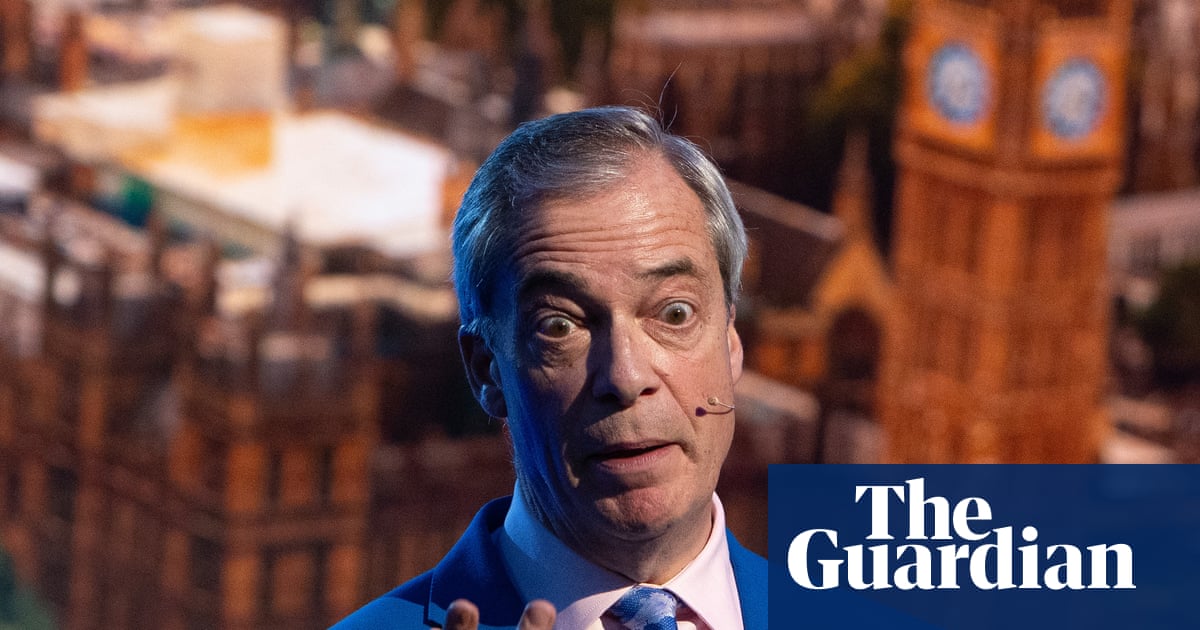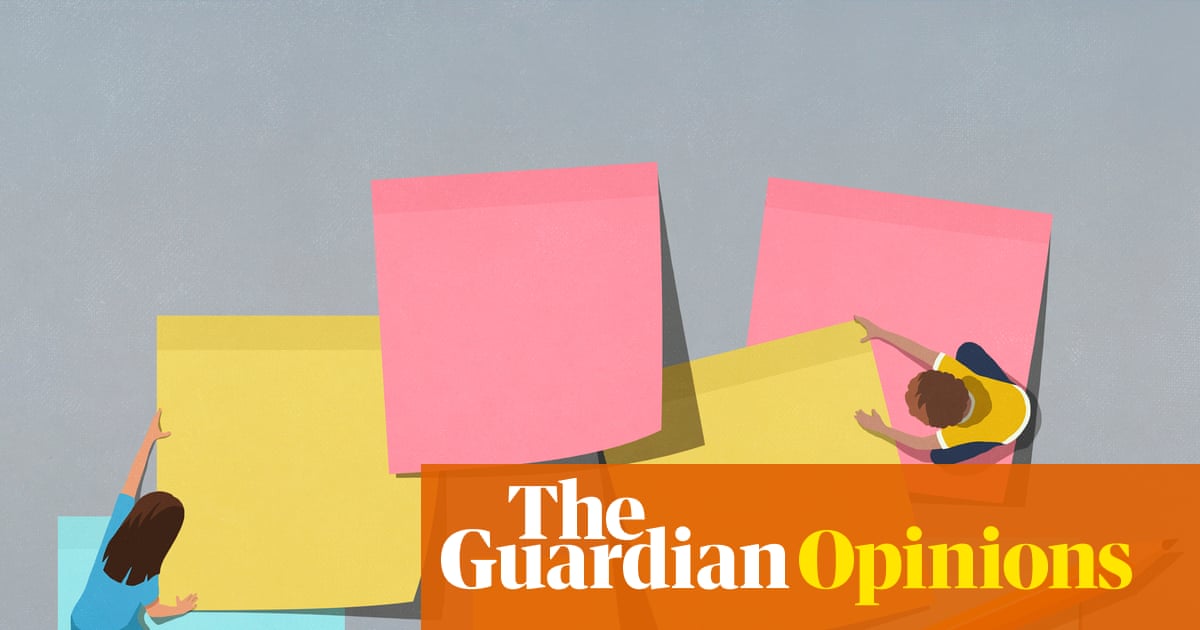They marched in their millions. Some waved the Stars and Stripes. Some clutched signs with slogans such as: “Nothing is more patriotic than protesting.” And some donned inflatable costumes that included aliens, chickens, clowns, frogs, lobsters, mushrooms, penguins, seahorses, sharks, squirrels, starfish and unicorns.
The energy of last weekend’s No Kings protests against Donald Trump’s authoritarianism was palpable and peaceful, drawing an estimated 7 million people to 2,700 rallies across the country. Among them were the Democratic senators Cory Booker, Ed Markey, Chris Murphy, Adam Schiff, Chuck Schumer, Raphael Warnock and Elizabeth Warren as well as the independent Bernie Sanders.
But many Democratic lawmakers did not attend. Their absence was conspicuous at a time when the party stands accused of lacking fight and failing to meet the moment. As Trump runs riot through US democracy, Democrats face the challenge of harnessing the spirit of No Kings and turning anti-Trump sentiment into votes at the ballot box.
“We’re in the process of a fight to save our democracy,” said Murphy, a senator for Connecticut who spoke at the event in Washington. “As I said at the rally, we’re not on the verge of an authoritarian takeover; we’re in the middle of it. And what I know from history is that the only thing that saves democracies from ruin when a demagogue is trying to destroy it is mass mobilisation.”
For all his grandstanding, Trump is deeply unpopular. About 62% of Americans say the country is going in the wrong direction, according to a new survey by the Public Religion Research Institute and Brookings Institution, and 56% describe Trump as a “dangerous dictator whose power should be limited”.
The popular revolt against him appeared slow at first but is now gathering steam. There have been three major street protests organised by a broad coalition of dozens of groups including civil rights organisations, labour unions and pro-democracy movements such as Indivisible.
The first, known as Hands Off!, was held in April and drew 3 million people. The second, No Kings, was staged in June to coincide with Trump’s 79th birthday and a rare military parade in Washington, attracted 5 million people. Then came last weekend’s reprise of No Kings, whose turnout of 7 million people was said to be the biggest civic action in the US for more than half a century.

No Kings – which draws its name from America’s founding principles and resistance to the tyranny of Britain’s King George III - and the Democratic party are both essentially leaderless but the former’s momentum has thrown the latter’s inertia into sharp relief.
Trump’s victory in last year’s election came like a kick to the solar plexus. His shock and awe approach on taking office left Democrats divided and despondent. The party’s approval rating was at the lowest level for a generation. In March Chuck Schumer, the minority leader in the Senate, was berated for allowing a government funding bill to sail through the chamber without using it to challenge Trump.
Six months on, however, Schumer’s Democrats have refused to vote on legislation that would avoid a government shutdown as they demand funding for healthcare. Polls suggest they are winning the argument in the court of public opinion.
Democrats are fighting back in other ways. Gavin Newsom, the governor of California, is pushing a new electoral map in his state that aims to bolster his party’s chances of regaining a congressional majority in 2026 and counter Republican efforts to add more seats in Texas and other states. The effort has been endorsed by former president Barack Obama.

Newsom has also been at the forefront of some savage online humour mocking Trump. Governor JB Pritzker of Illinois has been similarly pugnacious. This week Senator Jeff Merkley delivered a 22-hour 37-minute speech on the Senate floor describing Trump’s authoritarianism as “the most perilous moment, the biggest threat to our republic since the civil war”.
Murphy has been one of the most prominent senators sounding an alarm for the future of US democracy. He told the Guardian: “We should pay attention to the fact that we were a pretty unpopular party before we took a stand on government funding and we’re a more popular party after having taken this stance.
“People do want to see us fighting. They do want to see us engaging in risk-tolerant behavior. They want us to use leverage when we have it and I hope my colleagues recognise that we won’t be able to beat Trump if people don’t see the Democratic party as an effective opposition party.”
Indivisible has been urging Democrats to show some spine. Ezra Levin, its co-founder, believes the party has gone through three phases of defiance since Trump returned to power. First there was condescending dismissal.
He said: “It was there will be no defiance, there will be no resistance, the grassroots is done and discredited and the smart move is to demonstrate how well we can work with Trump because that’s the future of the party. That was the dominant strategic vision of the Democratic party circa November, December, even January of this year.”
According to Levin, however, once activists began showing up at town halls and took part in the Hands Off demonstration, Democrats were forced to recalibrate to a second phase, which he describes as performative resistance – the aesthetics of opposition.
“It was strongly worded letters. I think a memo went around Democratic circles to tell people to cuss more so there was more cursing. You saw fiery speeches but still a refusal to use leverage. It’s in this period that Schumer surrenders on the Republican bill and you see Cory Booker vote for the crypto bill after giving an inspiring speech.”
Now, Levin perceives a shaky third phase of unified defiance, exemplified by Democrats’ willingness to hold the line during the government shutdown. He hopes this resolve will feed into primary elections for next year’s midterms with candidates who are “fightback Democrats” rather than “do nothing Democrats”.
after newsletter promotion
Others dispute this binary characterisation. Matt Bennett, executive vice-president for public affairs at the thinktank Third Way, said he has not met a single Democrat who does not believe Trump poses an existential threat.
“It’s total bullshit,” he insisted. “Every single professional Democrat in America is in an absolute panic about what Trump means for everything we care about. There’s zero complacency. There is a huge set of disagreements on tactics and strategy but there is no disagreement about the level of the threat.”
Norman Solomon, national director of the progressive group RootsAction, however, said: “The Democratic party leadership doesn’t have the credibility, vitality or capacity to inspire millions of people. How many are inspired by Chuck Schumer or Hakeem Jeffries? The question answers itself. In effect, the most vibrant opposition party is civil society, which is gaining momentum with grassroots organising and national networking.”
Some commentators have drawn parallels with the Tea Party, a grassroots movement driven by a mix of libertarian, populist and conservative activists that emerged in 2009. It reshaped the Republican party with a focus on anti-establishment rhetoric, distrust of elites and racial hostility to Barack Obama that paved the way for Trump’s ascent.
The Tea Party also acted as an “anti-inspiration” for Levin and his wife and Indivisible co-founder Leah Greenberg when, in 2016, they put together a Google doc proposing that progressives emulate the Tea Party’s tactic of constituents pressuring their members of Congress to derail the president’s agenda.
Levin said: “I didn’t like their violence or bigotry or some of their strategies but I thought they were smart the way they organised as an outside movement to push the party to embrace their ideals. As heinous as those ideals were, they were effective.”
He added: “Effective movements cannot simply be tools of the formal party system. They need to push the party. A smart party will see historic levels of grassroots energy and say, oh goody, I want that, what do I have to do to get there? That’s going to require some substantive changes, both in who the messengers are that lead the party and also in what policies and strategies they support going forward.”

Whereas the Tea Party came from the right, No Kings is bigger, more ideologically diverse and able to avoid the factional disputes that inevitably dog a political party.
Simon Rosenberg, a Democratic strategist, said: “I hope this isn’t like the Tea Party because the Tea Party led to the Republican party becoming an extremist party and helped lead to Trump. The central focus of this movement should be to mitigate the damage that Trump is doing and to help pro-democracy forces win back power in the United States. To do that, we need a big tent.”
All is not lost for the Democrats. So far this year the party has won or overperformed the top of the 2024 ticket in 39 out of 40 special elections, flipping two state senate seats in Iowa alone. Democrats Mikie Sherrill and Abigail Spanberger are expected to prevail in next month’s races for governor of New Jersey and Virginia respectively. The party is feeling confident about the midterms, especially since the president’s party almost always loses ground.
Donna Brazile, a former interim chair of the Democratic National Committee, said: “The energy is already out there. Some people who decided not to participate in ’24 are now anxious to get back involved in their community and to prepare for the next election.”
Brazile also cautioned against trying to hijack the No Kings movement for party political ends. “I don’t see why we should make this partisan,” she said. “I don’t look at it as a Democratic party event. It was people coming out from all parts of life.
“I had a friend in a red district saying that for the first time they thought Donald Trump has gone too far. They wanted to do something that was meaningful, that was not partisan. To the extent that lawmakers and others find themselves marching with ordinary citizens, that’s important. But they’re following the people and not leading. The people lead at this moment.”

 3 months ago
65
3 months ago
65

















































